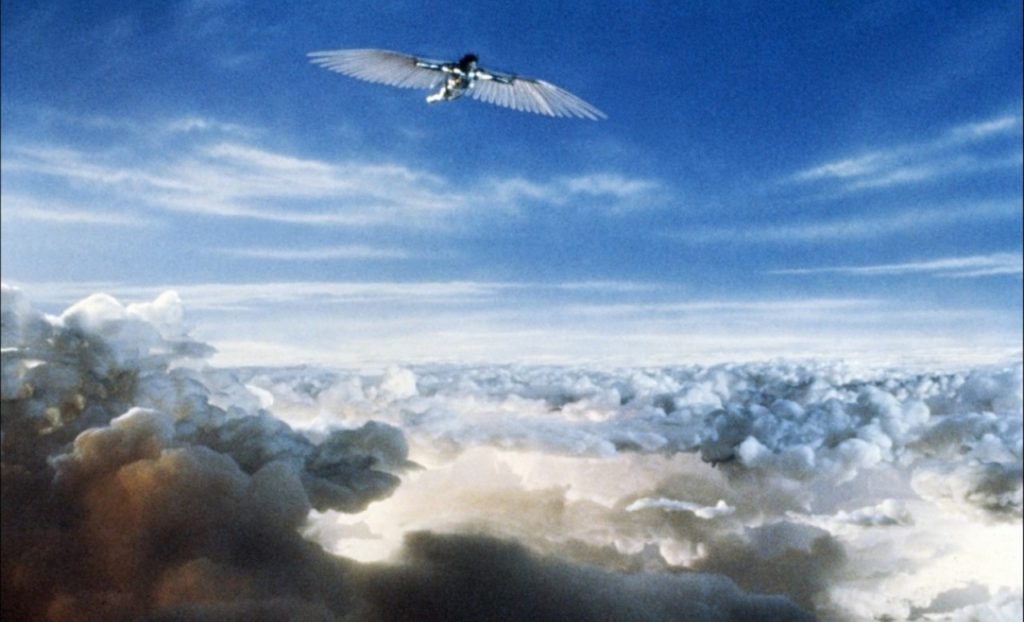
A new look for older eyes, with potentially more to come.
Haunting the Web Since 1999

A new look for older eyes, with potentially more to come.
Hrm. I wouldn’t have picked this grim direction for Superman — seems like a Captain America vibe would work better — but at least it’s different, I guess. Hopefully the presence of Chris Nolan will help rein in Snyder’s Sucker Punch sensibilities.
We come to it at last, the great battle of our age. In a perfect world, I would’ve gotten these up before 2010 hit. (Then again, in a perfect world, we’d have had a health care bill last July and I’d be going to work by eco-friendly jetpack.) In any case, here they are. No cheating! Please be sure to check out Part 1, Part 2, Part 3, and Part 4, before perusing the…
[The Rest of the List: 100-76 | 75-51 | 50-26 | 25-11 | 10-1]
[2000/2001/2002/2003/2004/2005/2006/2007/2008/2009]

10. The Dark Knight (2008)
|
From the original review: “Holy Catastrophic Wreck of a City, Batman! After two viewings, I’m happy to report Christopher Nolan’s moody, sinister The Dark Knight was well worth the wait, and bears the high expectations set for it quite impressively. In fact, at two and a half hours (which zip along, and even feel somewhat truncated at times — see below), this sprawling Gotham crime saga is almost too much movie to take in the first time around…Most importantly, if Begins, as I said in 2005, was ‘the Batman movie that fans of the Dark Knight have been waiting for,’ this is undoubtedly the Joker movie we’ve all been hoping for as its companion…Heath Ledger here is a true force of nature, embodying to a tee the malevolent, frighteningly insane jester of The Killing Joke and The Dark Knight Returns.“ From the year-end list: “Yes, it’s the obvious fanboy pick. And, admittedly, TDK had pacing problems — it was herky-jerky at times and the third act felt rushed. Still, in a not-particularly-good year for cinema, Christopher Nolan’s operatic reimagining of the Caped Crusader and his arch-nemesis was far and away the most enjoyable experience i had at the movies in 2008. And if Candidate Obama was America’s own white knight (metaphorically speaking) this past year, Heath Ledger’s Joker was its mischievous, amoral, and misanthropic id. If and when the economic wheels continue to come off in 2009, will stoic selflessness or gleeful anarchy be the order of the day? The battle for Gotham continues, and everybody’s nervously eyeing those detonators. Let’s hope the clown doesn’t get the last laugh.“ |
And let’s be honest: The Joker’s had a good year in 2009 (and, at least so far, our “white knight” of 2008 has been looking a little more Two-Faced than some of us anticipated back then.) In a decade that saw more comic book movies than even comic book fans might have asked for, Christopher Nolan’s grim and relentlessly-paced crime noir was the pick of the litter. Yeah, some problems here persist — The movie is a little overstuffed in its third act, and Bale’s bat-rasp doesn’t get any less goofy. Still, even more than Batman Begins, this was a full-immersion Gotham experience.
As per Nolan’s usual m.o., The Dark Knight didn’t shy away from grappling with larger themes amid all its impressive action setpieces. For example, there’s much ado here about the compelling need to maintain convenient myths — be it that Harvey Dent is a saint, or that Rachel will come back to Bruce, or that, as the Joker puts it, when bad things do happen, “it’s all part of the plan.”
Or, to take another example, TDK dwells more substantially than most any other comic films out there on the heavy price of vigilantism. Consider the bad behavior “the Batman” engenders among gun-toting do-gooders in hockey pads. And once Gordon, Dent, and Bats bend one rule — extradition — to get the mob’s moneyman back from Hong Kong, it’s Katy bar the door, basically. Next thing you know, Bats is “burning down the jungle” to get his man, including setting up a warrantless wiretap operation over in the basement at Wayne Enterprises. After all, once you’ve decided to go outside the law — say, to fight crime in a big bat suit — where does it all stop?
Of course, in the end the most memorable aspect of TDK was Heath Ledger’s twisted, anarchic, and thoroughly menacing take on the Clown Prince of Crime. Mark Hamill’s cartoon work notwithstanding, this was the Killing Joke-type Joker I had wanted to see on-screen since before the original Burton Batman. Particularly as compared to Jack Nicholson’s indulgent performance back in the day, Ledger brought us a better class of criminal — I just wish he could’ve stuck around for more.
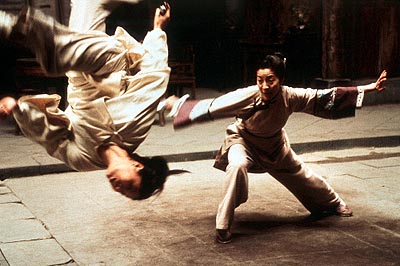
9. Crouching Tiger, Hidden Dragon (2000)
|
From the year-end list: “Amazing film. Nothing bad to say about it. Go now.“ |
I haven’t seen Ang Lee’s Crouching Tiger, Hidden Dragon in many years, so I can’t really vouch for how well its blend of wire-fu enhanced wuxia and ancient Middle Kingdom lore holds up in 2009. (I do know it’s better than Hero, House of Flying Daggers, Fearless, and Curse of the Golden Flower, to take several later examples of the genre.) Still, even coming as it did after The Matrix, also choreographed by Yuen Wo Ping, Crouching Tiger was an absolute jaw-dropper. And unlike Quentin Tarantino in the uneven Kill Bills, Lee wisely let Yuen’s choreography provide the kinetic energy here, rather than opting for frenetic and choppy editing.
Speaking of QT, I’m sure he and countless other kung-fu aficionados out there could plausibly tell you that Crouching Tiger, Hidden Dragon was nothing compared to Snake in the Eagle’s Shadow, Fist of Legend, or any number of other wuxia epics I haven’t seen. Point conceded. Nonetheless, I found Crouching Tiger, Hidden Dragon a breathtaking movie experience. And, with Chow Yun-Fat, Michelle Yeoh, and Zhang Ziyi on hand, I’d put the acting (tho’ not necessarily the martial arts) talent here up against any possible contender.

8. Before Sunset (2004)
As with Wong Kar-Wai’s In the Mood for Love and 2046, I first saw Richard Linklater’s Before Sunrise and Before Sunset back-to-back on DVD a few years ago. And, while Before Sunrise didn’t do much for me (I’m guessing the problem is that I should have seen it back in 1995, when I was a more idealistic 21), I thought Before Sunset was stunningly good. (For this one, I was juuust right.)
Basically told in real-time one Paris afternoon, Before Sunset brings Jesse and Celine, the lovers of the first film, back together ten years after their fateful night in Vienna. As it turns out, one of them didn’t show up for the romantic rendez-vous made at the end of Sunrise, which complicates things from the start. And, with ten years passed, both are now a little older and wiser in the ways of love. And by that, I mean they’ve become damaged, compromised, brittle, and gun-shy around each other.
Nonetheless, they shared something once upon a time in Vienna, and so they spend the next ninety minutes together — getting up-to-date, confessing recent disappointments, licking old wounds. Life didn’t turn out at all like they figured…and why is that, honestly? When and where did everything start to slip, and what might’ve happened if they had followed through on the promise made, and broken, ten years earlier?
In a way, there isn’t much “movie” here at all — It’s just two old lovers, chatting for ninety minutes as they stroll about the City of Light. Still, Before Sunset is a powerful film if you let it work on you. Ethan Hawke and Julie Delpy are both engaging and excellent, and not a false note is struck as each, slowly and almost despite themselves, lets their guard down around the other again. Ok, the great in media res ending of Sunset may veer a bit toward wish-fulfillment mode. But, y’know, why the heck not? After all this time, they still believe. (In fact, the ending to Before Sunset is remarkably like another film coming up…soon.)

7. No Country for Old Men (2007)
|
From the original review: ““Seen the arrow on the doorpost, saying, ‘This land is condemned’…” Well, Bob, East Texas may seem rough, but trust me, West Texas is even worse. I’m always going to have a soft spot for Miller’s Crossing, and The Big Lebowski is its own strange and beautiful beast, but the Coen Brothers’ tense, brooding No Country for Old Men, which I caught this morning, is right up among their best work, and that is no small thing…[I]f you harbored any doubts about the Coens after their botched remake of The Ladykillers, fret not. The brothers are back in form.“ From the year-end list: “[T]he Coens’ expertly-crafted No Country works as both a visceral exercise in dread and a sobering philosophical rumination on mortality and the nature of evil. (And in his chilling portrayal of Anton Chigurh, Javier Bardem has crafted a movie villain for the ages.)…No Country for Old Men seems so seamless and fully formed, so judicious and economical in its storytelling, that it reminds me of Salieri’s line in Amadeus: ‘Displace one note and there would be diminishment, displace one phrase and the structure would fall.’ A dark journey that throbs with a jagged pulse, No Country for Old Men is very close to the best film of the year, and — along with Miller’s Crossing, Fargo, and The Big Lebowski — yet another masterpiece sprung from the Coens’ elegant and twisted hive-mind.“ |
“The crime you see now, it’s hard to even take its measure. It’s not that I’m afraid of it. I always knew you had to be willing to die to even do this job. But, I don’t want to push my chips forward and go out and meet something I don’t understand. A man would have to put his soul at hazard. He’d have to say, ‘O.K., I’ll be part of this world.’” The Coens’ best film in a decade full of superior offerings, No Country for Old Men, as Matt Zoller Seitz eloquently argued in Salon last week, was a culmination of sorts for the brothers.
On its face, No Country is another sordid crime saga like Blood Simple or Fargo. But it’s also, like Fargo, The Man Who Wasn’t There, A Serious Man, and much of the Coens’ oeuvre, a philosophical rumination on what propels people along the paths they choose. When Anton Chigurh flips a coin to decide Carla Jean’s fate, who, really, is doing the deciding? Chigurh or the coin? “The coin don’t have no say. It’s just you.” “Well, I got here the same way the coin did.” Um, ok then. Is it Carla Jean, perhaps? After all, she could’ve picked tails. And, for that matter, Josh Brolin’s Llewelyn could never have taken the money in the first place. In fact, as soon as he does, he starts referring to himself as a dead man…So he knew the score.
But then again, as Tom Reagan asks in Miller’s Crossing, “Do you always know why you do things, Leo?” So maybe it was always out of their hands to begin with. After all, Ulysses Everett McGill’s travels through the South in O’Brother are dictated by the Fates. The Dude…The Dude abides. And Anton Chigurh himself takes a side-impact car crash like he takes anything else — It’s simply the way things are. As another character reminds us in No Country, “You can’t stop what’s comin’.” Or, to switch back to A Serious Man, that whirlwind’s getting closer, and you can’t stop it. So heed the words of the Jefferson Airplane, and find Somebody to Love…
The world of the Coens is all of a piece, and, for all its darkness, No Country is one of its purest expressions. (There’s a good bit of overlap in the world of Cormac McCarthy as well. No Country ends with Tommy Lee Jones talking about a dream he had, one in which his father carries fire into the dark. A father “carrying the fire” also figures very prominently in The Road.) In the Coens’ world, as in ours, the only predictable thing about life is that it is finite, so take things as they come and live it well. As Marge Gunderson puts it in Fargo, “There’s more to life than a little money, you know. Don’tcha know that? And here ya are, and it’s a beautiful day.” Accept with simplicity everything that happens to you. Abide.
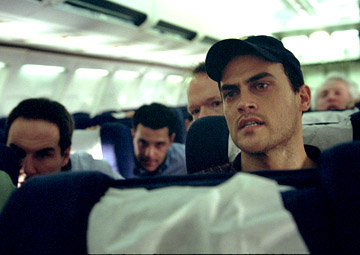
6. United 93 (2006)
|
From the original review: “Whether or not the world really needed a film about the events that took place on United Flight 93 the morning of September 11, 2001 is, I suppose, still an open question…That being said, having run the gauntlet earlier this week, I can now happily report that United 93 is magnificent, and arguably the best possible film that could’ve been made about this story. Both harrowing and humane, it’s the movie of the year so far.“ From the year-end list: “A movie I originally had no interest in seeing, Paul Greengrass’s harrowing docudrama of the fourth flight on September 11 captured the visceral shock of that dark day without once veering into exploitation or sentimentality…While 9/11 films of the future might offer more perspective on the origins and politics of those horrible hours, it’s hard to imagine a more gripping or humane film emerging anytime soon about the day’s immediate events. A tragic triumph, United 93 is an unforgettable piece of filmmaking.“ |
If ever there was a counterpoint to the cosmic shrug favored by Anton Chigurh, it can be found in Paul Greengrass’ harrowing docudrama United 93. Here, as we all know, ordinary Americans refused to simply accept the dismal hand fate dealt them. Inasmuch as they could, the passengers of United 93 turned to face events square on — They rose up, fought back, and, at the cost of their lives, saved the United States Capitol that Tuesday morning in September.
As I said at the time, I wasn’t entirely sure a film should be made about United 93, particularly so soon after the events at hand. But, if a movie was ever going to be made about that flight, let it be this one. With clarity, conviction, and compassion, Paul Greengrass manages first to bring the horror and chaos of the day back to life here, in a way that is as non-exploitative as possible. (Unlike Oliver Stone’s World Trade Center, which pretty much recreates the collapse from the inside, the initial impact on the towers here is shown merely as a blip on a radar screen.) And with the wave of fear and sheer confusion of that day vividly recreated — you can feel it gnawing at your gut at this point — Greengrass then lets the tale of United 93 unfold, so you really understand the dimensions of those passengers’ heroism that day, a heroism borne of survival instinct and a horrible recognition of the stakes involved.
It really is an amazing achievement how well Greengrass threaded the needle here. While being respectful of those lost that day, United 93 works as both art and history. It doesn’t go out of its way to demonize the terrorists or lionize the passengers — he just lets their respective actions that day speak for themselves. (The fateful words “Let’s roll,”, for example, are muttered almost as an aside, and are all the more powerful for it.) In short, what could’ve been a needless and even offensive film in other hands became, under Paul Greengrass, an outright classic.
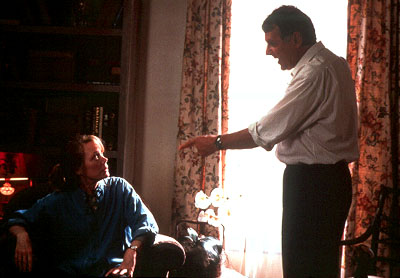
5. In the Bedroom (2001)
|
From the year-end list: “I can’t remember another film this year that resonated so strongly. While I think last year’s award hoopla erred too far toward the histrionics of Sissy Spacek and away from the nuanced performance of Tom Wilkinson, the moral center of the film, In the Bedroom nevertheless powerfully depicts how ostensibly ‘good’ people eventually find themselves contemplating and acting out evil deeds. Plenty of complex and memorable scenes throughout, such as Wilkinson watching the distracted guests at his son’s funeral, or his pained attempt to forge a connection with Marisa Tomei, a woman he has nothing in common with except loss. A very, very good film that, if anyone has the stomach for a double dose of grief, bookends nicely with Atom Egoyan’s The Sweet Hereafter.“ |
Ok, 2006’s Little Children was a bit of a dud. Still, In the Bedroom, based on the Andre Dubus short story “Killings,” was an extremely auspicious debut for writer-director Todd Field, previously best-known for his small role in Kubrick’s Eyes Wide Shut. With a strong sense of place — in this case, a small Maine lobster-town, probably not too far down the road from various Stephen King short stories — In the Bedroom is a powerful and morally complex study of how “good” people are, through rage, grief, and slowly curdling despair, eventually driven to dark deeds.
As I said above, Bedroom is a movie that resonates strongly in the details — say, Tom Wilkinson eyeing his son’s girlfriend (Marisa Tomei) with a combination of atta-boy pride and vague jealousy, or the nervous silence that descends around Wilkinson’s usual poker table after his son’s murder, or the way Wilkinson and Spacek tend to bury their grief — and their eventual plot — under mounds of everyday routine. More than most movies I can think of, In the Bedroom felt like a literary experience, one crafted by a filmmaker with a discerning, novelistic eye. So if any director can salvage something out of Cormac McCarthy’s heavy-handed Old West Grand Guignol, Blood Meridian, it might well be Field — It’s slated for release in 2011.
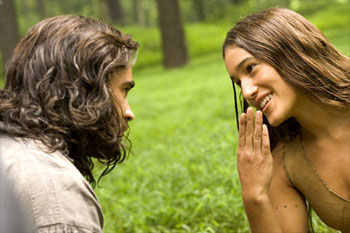
4. The New World (2005)
|
From the original review: “[A] masterfully crafted tale of discovery and transformation, passion and misunderstanding, intimacy and heartbreak, love and loss, and worlds Old and New. In short, it’s the best film of 2005.“ From the year-end list: “A movie which seemed to divide audiences strongly, Terence Malick’s The New World was, to my mind, a masterpiece. I found it transporting in ways films seldom are these days, and Jamestown a much richer canvas for Malick’s unique gifts than, say, Guadalcanal. As the director’s best reimagining yet of the fall of Eden, The New World marvelously captured the stark beauty and sublime strangeness of two worlds — be they empires, enemies, or lovers — colliding, before any middle ground can be established. For its languid images of Virginia woodlands as much as moments like Wes Studi awestruck by the rigid dominion over nature inherent in English gardens, The New World goes down as a much-overlooked cinematic marvel.“ |
The best way to sum up Terrence Malick’s achievement with The New World is to go back to the Gatsby quote I used in the original review: “For a transitory enchanted moment man must have held his breath in the presence of this continent, compelled into an aesthetic contemplation he neither understood nor desired, face to face for the last time in history with something commensurate to his capacity for wonder.“
That’s the extraordinary sensation at the center of Malick’s film. I’m still not quite sure how he pulled it off, but The New World feels like arriving on the threshold of some strange, danger-ridden, and wondrous alien planet called…America. (Put another way, before Pandora, there was Jamestown.) The New World is a First Contact story that somehow manages to maintain the momentous portent of this historic moment, when Old and New Worlds collided. And, perhaps as impressively, it does it without taking sides. Half the time we’re as inclined to side with Pocahontas and the sensible Powhatans, who, unlike the new, scurvy-ridden English arrivals, have the sense to prepare for winter (or at least to stop panning for non-existent gold when the frost sets in.) More than The Thin Red Line, more than Badlands, more even than Days of Heaven, I would say this is Malick’s magnum opus.

3. I’m Not There (2007)
|
From the original review: “[T]o be honest, it’s hard to imagine how this film plays to people who aren’t all that into Dylan…But, if you do have any fondness for Bob, oh my. The short review is: I loved it. Exploding the conventional music biopic into shimmering, impressionistic fragments, Todd Haynes has captured lightning in a bottle here. The movie is clearly a labor of love by and for Dylan fans, riddled with in-jokes, winks, and nods, and I found it thoughtful, funny, touching, and wonderful. Put simply…I’m Not There is my favorite film of the year. I can’t wait to see it again.“ From the year-end list: “Admittedly, it was a wonderful confluence of my interests. Nevertheless, Todd Haynes’ postmodern celebration of Bob Dylan, brimming over with wit and vitality and as stirring, resonant, and universal as a well-picked G-C-D-Em progression, was far and away my favorite film experience of the year. It seems to have slipped in a lot of critics’ end-of-year lists…but so be it — You shouldn’t let other people get their kicks for you anyway. A heartfelt, multi-layered, six-sided puzzle about the many faces and voices of Dylan, l found I’m Not There both pleasingly cerebral and emotionally direct, and it’s a film I look forward to returning to in the years to come. Everyone knows he’s not a folk-singer.“ |
“I was riding on the Mayflower when I thought I spot some land…” Speaking of the New World, welcome to Bob Dylan’s Old, Weird America, here brought to life as the Halloweentown-like hamlet of Riddle, where Richard Gere hides out as the sixth and oldest Bob among us. Hiding, as always, right there in plain sight.
So, in retrospect, Todd Haynes’ ode to the many facets of Bob Dylan probably turned out to be more inside baseball-ish than I originally assumed. I’ve since watched the movie with various folks who couldn’t care less about the man, and they just found the whole enterprise weird, inscrutable, and mostly uninvolving. And, hey, if you’re not feeling it, you’re not feeling it. Still, for those of us who’ve imbibed the Dylan Kool-Aid (See also: J. Hoberman)…wow. Haynes’ movie is a lovely gift, and way more intriguing than any standard-issue biopic I can imagine.
Basically, I adore this film. Each fragment of Bob here feels perfectly cast — Marcus Carl Franklin as the impossibly talented wunderkind…and fake, Christian Bale as the take-no-prisoners true-believer with his finger-pointin’ songs, Heath Ledger as the womanizing romantic and survivor of Blood on the Tracks, Ben Whishaw as the know-it-all, Rimbaudian interviewee, Richard Gere as the John Wesley Harding, Old Weird America Bob, and, of course, Cate Blanchett as the electric Blonde on Blonde non-blonde. Not to mention Charlotte Gainsbourg as Suze/Sara, Bruce Greenwood as Mr. Jones, Julianne Moore’s riff on Joan Baez….it’s an embarrassment of riches here.
To me, I’m Not There is a fascinating, inspiring movie, one as much about Dylan’s primordial American landscape as it is about the man from Hibbing, Minnesota. In defiance of the usual staid biopic routine, Haynes managed to create an ambitious, open-ended film that does justice to both a notoriously mercurial artist and his impressive body of work, one that deserves its place on the shelf right next to Dylan’s music. So, yeah, I’m Not There may be preaching to the converted here somewhat. But as a member of the choir, I say press on, brother Haynes, press on.
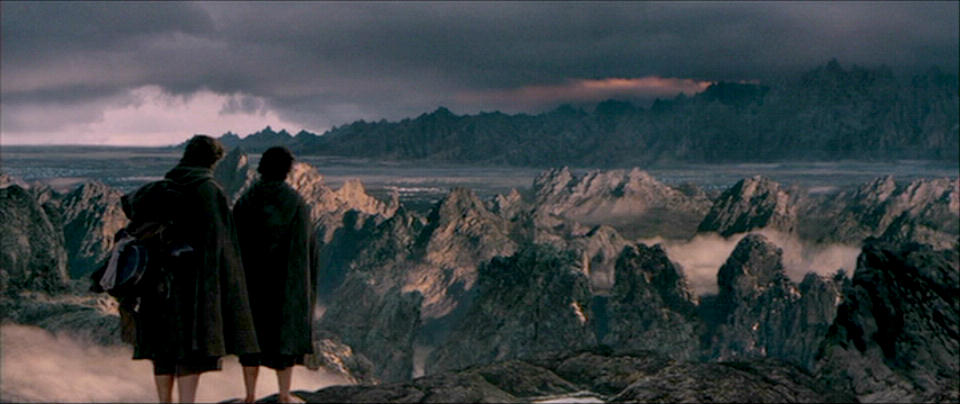
2. The Lord of the Rings (2001-2003)
|
From the original review (FotR): “Post-Film Update: They did it! They pulled it off!“ From the extended edition review (FotR): “The Galadriel/Lothlorien stuff works much better now, with both Galadriel and Celeborn taking on the flavor of Tolkien’s tome. Moreover, all of the underutilized members of the Fellowship – Boromir, Gimli, Merry, Pippen, and even Samwise – are given more characterization. And it just seems to take longer to get from place to place, which might take away from the film’s dizzying pace, but definitely captures more of the feel of the book.“ From the year-end list (FotR): “ Suffice to say, it was everything I had hoped for and more. NOT for fanboys and fangirls alone – In fact, given its epic breadth and cinematographic sweep, I’d put it up as a worthy successor to the works of David Lean. Mr. Lucas, the bar has been raised.“ From the original review (TTT): “After two showings yesterday, I must say I’m delighted and (still) surprised at how wondrous this second chapter turned out…[O]verall a deliciously good second installment in the Tolkien trilogy. And, with the ends of both the Isengard and Cirith Ungol storylines to be packed in with all the multitudinous events of ROTK, I see no way the next one can clock in under 210 minutes. Should be grand!“ From the extended edition review (TTT): “All in all, as with Fellowship, the extended Two Towers DVD includes a better, richer film loaded with tons of fascinating extras. If you’re a fan, I’m sure you’re getting it anyway…but if you’re a casual Rings admirer, the TTT:EE is just as worth picking up as the FOTR:EE.“ From the year-end list (TTT): “No surprise here. Although Fellowship may have delivered a bigger emotional impact, Peter Jackson and co. handled massive expectations with aplomb and deftly translated J.R.R. Tolkien’s most unwieldy tome (Silmarillion notwithstanding) into the action-epic of the year.“ From the original review (RotK): “Return of the King is an amazing conclusion to a trilogy that’s surpassed all expectations and, I say this without hyperbole, redefined the medium — From the technical breakthrough of Gollum to the seamless intertwining of jaw-dropping FX and character-driven emotion throughout, these films have expanded our vision of the possible and set a new standard for epic filmmaking.“ From the extended edition review (RotK): “As with the FotR:EE and the TTT:EE, the Extended Edition is clearly a better film than the theatrical cut, with richer, denser characterizations, more Tolkien lore, and an improved sense of flow…All in all, RotK:EE, like its predecessors, is a wonderful gift to the fans of Tolkien and Middle Earth. And, although we have come now to the end, these three DVD sets (which look great on the shelf together) will now live on forever as a beacon of hope to fandom.“ From the year-end list (RotK): “If you didn’t see this pick coming, welcome to GitM…Even in spite of the pacing problems mandated by the TE running time, Return of the King is a marvel, the perfect ending to this epic for the ages and easily the best third-movie in a series ever. There’s so many ways these films could’ve turned out atrociously…The fact that they didn’t — that they instead shattered all expectations while staying true to Tolkien’s vision — is a miracle of inestimable value. In the post-Star Wars age, when epics have been replaced by ‘blockbusters,’ and most event movies have been hollowed-out in advance by irony, excessive hype, dumbing-down, and sheer avarice, Peter Jackson has taught us to expect more from the cinema once again. Beyond all imagining, he took the ring all the way to Mordor and destroyed that sucker. So have fun on Kong, PJ, you’ve earned it.“ |
“Three Rings for the Elven-kings under the sky. Seven for the Dwarf-lords in their halls of stone. Nine for Mortal Men doomed to die. One for the Dark Lord on his dark throne, In the Land of Mordor where the Shadows lie. One Ring to rule them all, One Ring to find them, One Ring to bring them all and in the darkness bind them, In the Land of Mordor where the Shadows lie.“
If you get any goosebumps while listening to J.R.R. Tolkien read the last paragraph, then, you were probably like me at the start of this decade: looking for any news you could find about the forthcoming (live-action) movie version of The Lord of the Rings trilogy, directed by Peter Jackson of Heavenly Creatures, The Frighteners, and Bad Taste. On January 12, 2001, you probably also filed into the earliest possible performance of New Line’s (very quality) Thirteen Days to catch the highly anticipated trilogy trailer.
And when December 19, 2001 at long last rolled around, you may too have buried your Phantom Menace butterflies deep down inside, took up what fanboy or fangirl standards you possessed (I myself wore the One Ring…on a chain, of course), and filed in to Fellowship to see what Jackson had come up with. At which point we — you and I both — were confronted with…blackness.
“I amar prestar aen, han mathon ne nen…The world is changed. I feel it in the water. I feel it in the earth. I smell it in the air. Much that once was is lost, for none now live who remember it.” And just about right then and there, it was clear: Holy Sh*t! They did it!
Yes, there would be gigantic battles soon thereafter, massive CGI-enhanced affairs to rival the most vivid fever dreams of Led Zeppelin. And, of course, there would be elves, dwarves, and right twee little ‘obbits. But the decision by Jackson, Fran Walsh, and Philippa Boyens to start their grand adventure with that sharp, Tolkienesque twinge of melancholy indicated right away that they had not been turned by the Nazgul of Hollywood, nor by the power of the effects at their disposal. Rather, they had stayed true to the sad and cautionary spirit of Tolkien’s tale.
Do I have quibbles about Peter Jackson’s Lord of the Rings? Of course. Fellowship of the Ring is just about perfect to me, with the small-but-notable exceptions of Weathertop and the Ford at Bruinen. (Aragorn just should not be able to take out five Nazgul like that. And — weirdly, given his horror background — PJ somehow missed the real darkness of Frodo’s turning after his Morgul wound: A growing part of him wants to go with the Riders. “Come back, come back…to Mordor we will take you.“)
And, as the story moves forward into The Two Towers and Return of the King, more minor problems emerge. (The “Choices of Master Samwise,” Denethor’s lack-of-palantir and the too-bright-by-half Shelob’s lair, for example.) Plus, however anti-climactic and un-filmic, a strong argument can be made that the excised Scouring of the Shire — nobody wins a war, the thing you fought for is destroyed by the fighting for it — is half the point of Tolkien’s tale…although I can see why it got left out.
But those quibbles aside, The Lord of the Rings was so much better than any of us really had any right to expect. In fact, the trilogy has so many secret weapons that it’s hard to enumerate them all. There’s the variegated natural beauty of New Zealand standing in for Middle Earth, as photographed by cinematographer Andrew Lesnie. (I would argue that the most powerful moments in the Fellowship prologue are those accompanied by simple nature shots: “Darkness crept back into the forests of the world. Rumor grew of a Shadow in the East, whispers of a nameless fear…“)
There’s Ian McKellen’s turn as Gandalf, a performance that’s almost impossible to imagine anyone else pulling off as well. There’s the hauntingly beautiful music of Howard Shore, who was operating on another plane in these films. There was the art direction help by John Howe and Alan Lee — two artists who had spent their lives dreaming up Middle Earth. With PJ, RIchard Taylor, and the enterprising elves of WETA, they helped bring Tolkien’s words to life as never before. And, speaking of WETA, they and Andy Serkis brought us Gollum, a CGI-creation like none we had ever witnessed.
Ultimately, Lord of the Rings is the story of creatures, living long after the calamitous events that shaped their age, that now must face the End of their World. And, more than the calamity itself, the real story is about the characters’ various responses to this time of testing. PJ et al got this. More than most films of its ambition, its crafters understood that emotional scale was as important as visual grandeur — that, at its heart, the trilogy isn’t so much about wizards and warriors as it is about friendship, the nature of evil, and persevering in dark times. And because they got that right, The Lord of the Rings is an epic unmatched in fantasy cinema before or since.
A final footnote: While the tone and thematic weight of the story is quite different, one hopes the old gang — with their new Hobbit friend, Guillermo del Toro — can bring about similar magic when they tackle “the incident with the dragon” in short order. The road goes ever on…next stop, December 2011.
Speaking of which, here we are at the Crack of Doom at long last. So, to number 1 and the end of this Oughty Age…
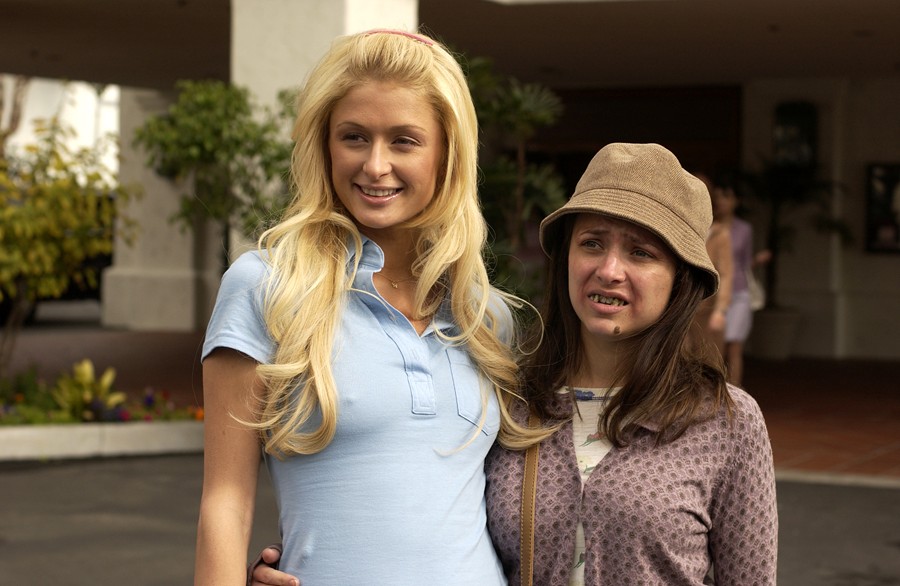
1. The Hottie and the Nottie (2008)
A surprising heartwarming tale about body image and the perils of celebrity, The Hottie and the Nottie is…pretty obviously not on this list. To be honest, I never saw it. But I feel totally ok about presuming that it was an abomination in the eyes of the cinema Gods. Sorry, just seeing if anyone made it down this far. Ahem. #1 is in fact…
It’s coming…
It is…
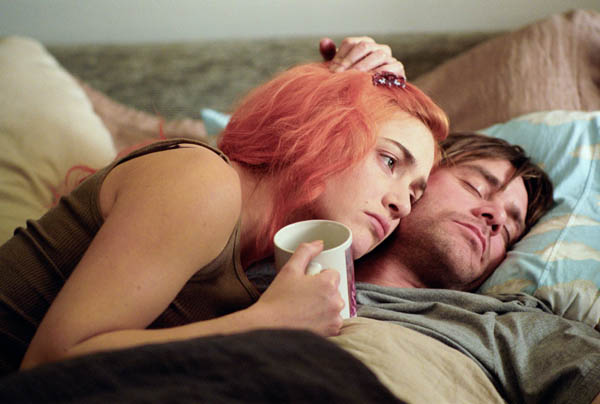
1. Eternal Sunshine of the Spotless Mind (2004)
|
From the original review: “I thought Michel Gondry’s Eternal Sunshine of the Spotless Mind lived up to the hype and then some. One part Annie Hall, one part Sliding Doors, three parts Charlie Kaufman, Eternal Sunshine is an exceptionally strange take on the romantic comedy…(It probably helped that I tend to be a fan of almost all the folks at work here…Jim Carrey, Kate Winslet, Tom Wilkinson, Mark Ruffalo, Elijah “Bad Frodo” Wood, and David Cross…Sunshine is a fun, thought-provoking look at relationships and memory.“ From the year-end list: “The one true classic of 2004, Eternal Sunshine has only grown in my estimation since its initial release in March. (David Edelstein’s take on it as one of Harvard philosopher Stanley Cavell‘s remarriage comedies is well worth reading.) A heartfelt examination of love, loss, and memory, Eternal Sunshine was also a strikingly adult take on romance and relationships…With great performances from a caged Jim Carrey and an electric Kate Winslet, the film managed to be both an earnest, passionate love story and a wistful paean to those person-shaped holes we all carry in our hearts and memories…(Why even bother? We need the eggs.)“ |
“Happy is the blameless vestal’s lot, the world forgetting by the world forgot. Eternal sunshine of the spotless mind! Each pray’r accepted, and each wish resign’d.” That poem by “Pope Alexander” is the epigram of, in my humble opinion, the best movie of the decade. I first saw Eternal Sunshine, Michel Gondry and Charlie Kaufman’s second collaboration after 2001’s smart but very uneven Human Nature, in the stress-case period just before my orals exams, so I didn’t give the film the review it deserved. (Although I tried to rectify that oversight some with 2004’s end-of-year list.) Suffice to say, Eternal Sunshine is a masterpiece — beautiful, heartfelt, incisive, and humane.
Like the best science fiction, Eternal Sunshine uses a sci-fi premise — a friendly neighborhood clinic that can erase bad relationships for you — to capture something elusive about our human condition, in this case about memory, love, and regret. Is it better to have loved and lost, or never to have loved at all? While various techs (Mark Ruffalo, Elijah Wood, Kirsten Dunst, Tom Wilkinson) handle the details of the medical procedure at hand (and conduct their own affairs of the heart), that’s the question Jim Carrey’s Joel wrestles with as he remembers — one final time before the lights go off — his days and nights with Kate Winslet’s Clementine.
I’ll concede that certain dream-elements of Eternal Sunshine don’t quite work — the baby-Joel under the table and in-the-sink stuff, for example. And you could argue, and some do, that all of the techie shenanigans outside Joel’s mind are superfluous, although I enjoy them all the same (and, of course, they set up the final payoff involving the leaked tapes.) In fact, I tend to like the film’s ragged, organic, and hand-crafted feel all around.
Still, the movie’s real strength is its acute inquiry into the Ballad of Joel and Clementine (not to mention Joel-and-Clem, as a unit, and Joel’s in-head Clem to boot.) And this is where Eternal Sunshine is dead-on and so often devastating. Note the perfectly-selected bric-a-brac stuff — all the random, built-up detritus of a life together — that Joel must collect and hide away forever to get his mind wiped. Or his gloomy gus, self-lacerating inner monologue when he first meets Clem on the Montauk train. Consider the moments that signify the end is near — such as the usual jokes getting old, or that grisly conversation in the Chinese restaurant. And consider too the details Joel remembers and cherishes, like their trip to the frozen Charles, or that night they saw the elephants, or kissing under the sheets, or just Clem resting her cheek on his, one bright and lazy winter morning.
Given that the bottom eventually drops out, was it all worth it, in the end? Both Joel and Clementine have to answer that question with open eyes as Eternal Sunshine comes to a close. And this is where people tend to either find the movie dark and gloomy or legitimately romantic, in a way few movies are. I go the latter route — Joel and Clem know what’s 99.44% likely to happen this time: The same thing that happened last time. “I don’t see anything I don’t like about you.” “But you will! But you will, and I’ll get bored with you and feel trapped, because that’s what happens with me.“
And, yet, they take the plunge anyway, partly because the good times were good. Partly because love in the real world is never a meet-cute ’til the happily-ever-after anyway. It’s negotiation, conversation, laughter, and crumbling defenses, a give-and-take process of two people slowly falling together. And partly because maybe, just maybe, the bad times were not inevitable, and things will break a different way this time. Screw Anton Chigurh –There’s no fate but we make.
In all too many ways, from 9-11 to the Great Recession, the Oughts were ten years to forget. (And, on a personal level, it’s safe to say I spent much of the past decade glum about one break-up or another.) But would we be better off forgetting the Oughts completely? Surely, there were flecks of gold throughout these past ten years, however dismal and Dubyaesque the decade often turned out to be. Regardless of how things pan out at the macro level, whether for good or ill, there are always small moments to cherish, days to remember fondly, and films to treasure. In fact, I’ve put one hundred of my own here. And of those, for me, Eternal Sunshine of the Spotless Mind shone the brightest.
So, we finally made it. That’s the end of the list, folks, hope y’all enjoyed it. Fare thee well, gone away, there’s nothing left to say.
Hey, wait a sec, that reminds me…
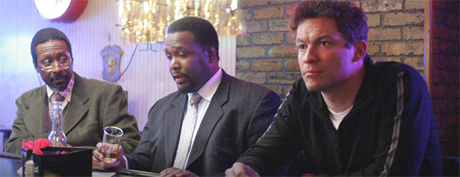
Special Award. The Wire (2002-2008)
|
From the series-finale review: “Pour a glass of Jamesons and give the devil (way down in the hole) his due: The Wire, a television show with a better claim than most to the title of “Best Ever” (and definitely the best show ever made about American politics), ends this evening…And you know the only thing better than having enjoyed all 60 hours of the show? Having never seen it at all. If that’s you, pick up Season 1 and start from the beginning — you’re in for a real treat.“ |
I’m not about to do a Best of the Decade TV retrospective here at GitM, partly because I don’t feel like I watch enough TV to really judge. (Although, looking at other lists, it seems I caught a lot of the good stuff: Deadwood, Arrested Development, Six Feet Under, Mad Men, Breaking Bad, Battlestar Galactica, Curb Your Enthusiasm, The Sopranos, etc.) Besides, after this ridiculously extended movie project, I’ll be damned if I feel like going to the pop-culture-nostalgia well again just yet. Still, call it a 60-hour-movie if it helps square the circle, but The Wire must get its props.
With a journalist’s eye for detail and the gallows humor of good homicide po-lice, David Simon, Ed Burns, & co. used the rhythms of a cop show to hook us on an in-depth, comprehensive, and scathing diagnosis of life in the 21st century American body politic, as represented here by the failing city-state of Baltimore. Here, the Institutions are the new Gods, and people get crushed whenever they try to flout their dictates. In fact, people are worth less and less every day — Because, wherever you are in the game, there’s always someone else younger, hungrier, and/or less principled gunning for your spot.
That may sound heavy and edutainmentish, but it wasn’t. Week after week, The Wire was also the funniest hour-long on television. It built, slowly, gradually, inexorably — By the end of Season 1, I liked the show quite a bit but thought Deadwood probably edged it out in terms of quality. By the end of Season 3, I thought it was far and away the best show on television and was awestruck by its ambition. And we still had two more seasons to go.
David Simon and the gang eventually got so sick of being called “Dickensian” all the time that they turned it into a joke in Season 5: The Baltimore Sun is only interested in “the Dickensian aspect” of the streets, meaning simple, manageable problems that could be solved if, as per many Dickens tomes, only some highly convenient and thoroughly implausible Benefactor came out of nowhere to take the trouble.
Heh, point conceded. Still, as many others have noted, the term applies regardless. Just as Dickens brought industrial corruption and the plight of Victorian London’s social underclass to life at the close of the 19th century, The Wire is the piece of journalistic fiction generations one or two hundred years hence will look to to understand the urban landscape of the Oughts. And more likely than not, then as it is now, the game will still be the game. Always.
100. Dave Chappelle’s Block Party.
99. SW: Revenge of the Sith.
98. Unbreakable.
97. Borat.
96. The Quiet American.
95. The Savages.
94. About a Boy.
93. The Matrix: Reloaded.
92. L’Auberge Espagnole.
91. King Kong.
90. Capote.
89. Star Trek.
88. Inside Man.
87. Munich.
86. Meet the Parents.
85. Sin City.
84. Bloody Sunday.
83. The Squid and thr Whale.
82. Primer.
81. American Psycho.
80. Brokeback Mountain.
79. Drag Me to Hell.
78. Michael Clayton.
77. The Fountain.
76. The Fog of War.
75. The Queen.
74. Anchorman: The Legend of Ron Burgundy.
73. U2 3D.
72. Ocean’s 12.
71. In the Valley of Elah.
70. Boiler Room.
69. Jackass.
68. Secretary.
67. (500) Days of Summer.
66. Lord of War.
65 Bamboozled.
64. Master & Commander.
63. Mystic River.
62. HP IV: Goblet of Fire.
61. Iron Man.
60. Batman Begins.
59. Good Night, and Good Luck.
58. District 9.
57. Wonder Boys.
56. The Man Who Wasn’t There.
55. The Descent.
54. Ballets Russes.
53. Battle Royale/Infernal Affairs.
52. Zodiac.
51. 28 Weeks Later.
50. The Proposition.
49. The Bourne Trilogy.
48. The Prestige.
47. WALL-E.
46. The Royal Tenenbaums.
45. 24 Hour Party People/Control.
44. Coraline.
43. O Brother Where Art Thou?
42. Shaun of the Dead.
41. The Pianist.
40. Knocked Up.
39. Sideways.
38. Let the Right One In.
37. Intolerable Cruelty.
36. X-Men 2/Spiderman 2.
35. The Wrestler.
34. The Hurt Locker.
33. A Serious Man.
32. The Cooler.
31. Moon.
30. Requiem for a Dream.
29. Sexy Beast.
28. Milk.
27. Layer Cake.
26. Garden State.
25. Donnie Darko.
24. High Fidelity.
23. In the Mood for Love/2046.
22. The 25th Hour.
21. Mulholland Drive.
20. The Diving Bell & the Butterfly.
19. The Incredibles.
18. Memento.
17. In the Loop.
16. Traffic.
15. Lost in Translation.
14. Syriana.
13. Children of Men.
12. Letters from Iwo Jima.
11. The Lives of Others.
10. The Dark Knight.
9. Crouching Tiger, Hidden Dragon.
8. Before Sunset.
7. No Country for Old Men.
6. United 93.
5. In the Bedroom.
4. The New World.
3. I’m Not There.
2. Lord of the Rings.
1. Eternal Sunshine of the Spotless Mind.
Special Award. The Wire.
“You’re the kind of cocktail that comes on like sugar but gives you a kick in the head.” Star and director George Clooney takes a period-piece page from his Coen buddies in the new trailer for his football comedy Leatherheads, also with John Krazinski and Renee Zellweger. Given Clooney’s track record with Confessions of a Dangerous Mind and Good Night, and Good Luck, I’d probably have seen this anyway. But throw in the mid-twenties flavor and Brazil‘s Jonathan Pryce and it’s a lock.
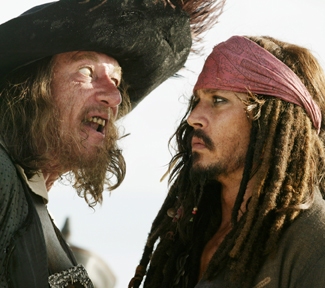 I know, I know. This ship has sailed, with its filthy hoard of ill-gotten box office lucre already stashed under decks, so get to Knocked Up and Ocean’s Thirteen already. At this point you really don’t need me to tell you that Gore Verbinski’s Pirates of the Caribbean III: At World’s End, despite having Johnny Depp and $100 million in special effects at its command, was a bloated, washed-up, and mostly boring two hours of needless exposition and empty spectacle. But, there it is. One might remember that I kinda loathed the second Pirates movie last summer, and that was with a stash of bootlegged spirits and a good woman at my side to help relieve the remorseless tedium. So, why did I even bother seeing At World’s End? Well, Stephanie Zacharek of Salon summed it up perfectly: “[A]t this point, the ‘Pirates’ franchise is essentially collecting a tax from moviegoers: See it and like it, matey, or you’ll be out of step with the whole universe! And who wants that?” Well, I paid my movie-tax tribute, you bottom-line buccaneers and covetous corsairs, now avast with ye.
I know, I know. This ship has sailed, with its filthy hoard of ill-gotten box office lucre already stashed under decks, so get to Knocked Up and Ocean’s Thirteen already. At this point you really don’t need me to tell you that Gore Verbinski’s Pirates of the Caribbean III: At World’s End, despite having Johnny Depp and $100 million in special effects at its command, was a bloated, washed-up, and mostly boring two hours of needless exposition and empty spectacle. But, there it is. One might remember that I kinda loathed the second Pirates movie last summer, and that was with a stash of bootlegged spirits and a good woman at my side to help relieve the remorseless tedium. So, why did I even bother seeing At World’s End? Well, Stephanie Zacharek of Salon summed it up perfectly: “[A]t this point, the ‘Pirates’ franchise is essentially collecting a tax from moviegoers: See it and like it, matey, or you’ll be out of step with the whole universe! And who wants that?” Well, I paid my movie-tax tribute, you bottom-line buccaneers and covetous corsairs, now avast with ye.
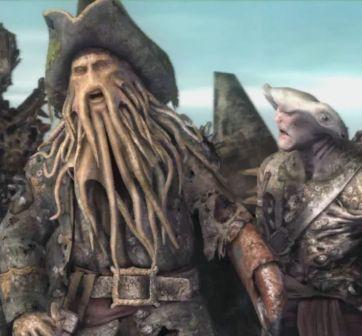 So, as you may or may not remember if you labored your way through Dead Man’s Chest, this installment of the Pirates franchise begins with Captain Jack Sparrow (Depp) among the recently deceased, or at least trapped in the pirate Underworld that is Davy Jones’ Locker, while the rest of the team (Orlando Bloom, Keira Knightly et al) finds they must band together with first-film villain Capt. Barbossa (Geoffrey Rush) to break Sparrow out, Jabba’s-palace style. But before that plot resumes, we witness a series of grisly civilian hangings undertaken by the East India Company’s Big Bad (Tom Hollander), who now has the supernatural man-squid Davy Jones (Bill Nighy) in his thrall. (It’s a long story.) These executions happen not only to weed out the pirate insurgency and win the war on (naval) terror but, more ominously, to provoke a particular seafaring ditty in the unwashed masses, one that, once uttered, must provoke a meeting of the Pirate Council, whose nine lords are known by their special Pieces of Eight. But, let’s not forget, there’s also the matter of an enchanted compass on Jack’s person which points the way to one’s heart’s desire, and, for that matter, a magical heart thumping in a special chest that grants power over Davy Jones, and some very important charts on the person of Lando-ish pirate Chow Yun-Fat, and an undead monkey and a scorned sea-goddess and Gareth from The Office and…oh, I give up already. Just go see the movie. Or better yet, don’t.
So, as you may or may not remember if you labored your way through Dead Man’s Chest, this installment of the Pirates franchise begins with Captain Jack Sparrow (Depp) among the recently deceased, or at least trapped in the pirate Underworld that is Davy Jones’ Locker, while the rest of the team (Orlando Bloom, Keira Knightly et al) finds they must band together with first-film villain Capt. Barbossa (Geoffrey Rush) to break Sparrow out, Jabba’s-palace style. But before that plot resumes, we witness a series of grisly civilian hangings undertaken by the East India Company’s Big Bad (Tom Hollander), who now has the supernatural man-squid Davy Jones (Bill Nighy) in his thrall. (It’s a long story.) These executions happen not only to weed out the pirate insurgency and win the war on (naval) terror but, more ominously, to provoke a particular seafaring ditty in the unwashed masses, one that, once uttered, must provoke a meeting of the Pirate Council, whose nine lords are known by their special Pieces of Eight. But, let’s not forget, there’s also the matter of an enchanted compass on Jack’s person which points the way to one’s heart’s desire, and, for that matter, a magical heart thumping in a special chest that grants power over Davy Jones, and some very important charts on the person of Lando-ish pirate Chow Yun-Fat, and an undead monkey and a scorned sea-goddess and Gareth from The Office and…oh, I give up already. Just go see the movie. Or better yet, don’t.
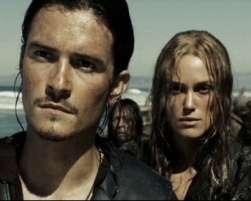 To be fair, At World’s End isn’t as depressing or disappointing an action-packed threequel as, say, The Matrix: Revolutions, if only because expectations were so much lower heading into these already-muddy waters. And, ’tis true, Pirates of the Caribbean III is a marginally better film than the last outing — Instead of beating you into submission with blunt, numbing spectacle, this film mostly just tries to exposition you to death, which strangely enough I found preferable. Still, this is a bad film. Even Depp, who is an inordinately gifted actor who can make almost anything watchable, starts to grate here (as, alas, does Geoffrey Rush.) In fact, Depp’s once-fresh and funny mannerisms as Jack Sparrow have badly calcified by this point — at times, particularly when the movie steals a page or three from Being John Malkovich, he looks like he’s just phoning in his Hunter schtick. (For their part, Bloom and Knightley, pretty as they are, have no other schtick. It’s Legolas and Love, Actually, all over again.)
To be fair, At World’s End isn’t as depressing or disappointing an action-packed threequel as, say, The Matrix: Revolutions, if only because expectations were so much lower heading into these already-muddy waters. And, ’tis true, Pirates of the Caribbean III is a marginally better film than the last outing — Instead of beating you into submission with blunt, numbing spectacle, this film mostly just tries to exposition you to death, which strangely enough I found preferable. Still, this is a bad film. Even Depp, who is an inordinately gifted actor who can make almost anything watchable, starts to grate here (as, alas, does Geoffrey Rush.) In fact, Depp’s once-fresh and funny mannerisms as Jack Sparrow have badly calcified by this point — at times, particularly when the movie steals a page or three from Being John Malkovich, he looks like he’s just phoning in his Hunter schtick. (For their part, Bloom and Knightley, pretty as they are, have no other schtick. It’s Legolas and Love, Actually, all over again.)
The trailer for Pirates of the Caribbean 3: At World’s End is now online. I thought the last one turned out to be an abysmal shipwreck of sorts, and, great blistering barnacles, this sadly looks like more of the same to me.
Well, there are still a number of flicks I haven’t yet seen — David Lynch’s Inland Empire, for example, which I hope to hit up this weekend. But as the Oscar nods were announced today, and as the few remaining forlorn Christmas trees are finally being picked up off the sidewalk, now seems the last appropriate time to crank out my much belated end-of-2006 film list (originally put off to give me time to make up for my New Zealand sojourn.) To be honest, I might’ve written this list a few weeks earlier, had it not happened that I ended up seeing the best film of 2005 in mid-January of last year, thus rendering the 2005 list almost immediately obsolescent. But, we’ll get to that — As it stands, 2006 was a decent year in movies (in fact a better year in film than it was in life, the midterms notwithstanding), with a crop of memorable genre flicks and a few surprisingly worthy comebacks. And, for what it’s worth, I thought the best film released in 2006 was…
1. United 93: A movie I originally had no interest in seeing, Paul Greengrass’s harrowing docudrama of the fourth flight on September 11 captured the visceral shock of that dark day without once veering into exploitation or sentimentality (the latter the curse of Oliver Stone’s much inferior World Trade Center.) While 9/11 films of the future might offer more perspective on the origins and politics of those horrible hours, it’s hard to imagine a more gripping or humane film emerging anytime soon about the day’s immediate events. A tragic triumph, United 93 is an unforgettable piece of filmmaking.
[1.] The New World (2005): A movie which seemed to divide audiences strongly, Terence Malick’s The New World was, to my mind, a masterpiece. I found it transporting in ways films seldom are these days, and Jamestown a much richer canvas for Malick’s unique gifts than, say, Guadalcanal. As the director’s best reimagining yet of the fall of Eden, The New World marvelously captured the stark beauty and sublime strangeness of two worlds — be they empires, enemies, or lovers — colliding, before any middle ground can be established. For its languid images of Virginia woodlands as much as moments like Wes Studi awestruck by the rigid dominion over nature inherent in English gardens, The New World goes down as a much-overlooked cinematic marvel, and (sorry, Syriana) the best film of 2005.
2. Letters from Iwo Jima: Having thought less of Flags of our Fathers and the woeful Million Dollar Baby than most people, I was almost completely thrown by the dismal grandeur and relentless gloom of Eastwood’s work here. To some extent the Unforgiven of war movies, Iwo Jima is a bleakly rendered siege film that trafficks in few of the usual tropes of the genre. (Don’t worry — I suspect we’ll get those in spades in two months in 300.) Instead of glorious Alamo-style platitudes, we’re left only with the sight of young men — all avowed enemies of America, no less — swallowed up and crushed in the maelstrom of modern combat. From Ken Watanabe’s commanding performance as a captain going down with the ship to Eastwood’s melancholy score, Letters works to reveal one fundamental, haunting truth: Tyrants may be toppled, nations may be liberated, and Pvt. Ryans may be saved, but even “good wars” are ultimately Hell on earth for those expected to do the fighting.
3. Children of Men: In the weeks since I first saw this film, my irritation with the last fifteen minutes or so has diminished, and Alfonso Cuaron’s Children of Men has emerged for what it is — one of the most resonant “near-future” dystopias to come down the pike in a very long while, perhaps since (the still significantly better) Brazil. Crammed with excellent performances by Clive Owen, Michael Caine, Chiwetel Ejiofor and others, Children is perhaps a loosely-connected grab bag of contemporary anxieties and afflictions (terrorism, detainment camps, pharmaceutical ads, celebrity culture). But it’s assuredly an effective one, with some of the most memorable and naturalistic combat footage seen in several years to boot. I just wished they’d called that ship something else…
4. Borat: Cultural Learnings of America for Make Benefit Glorious Nation of Kazakhstan: True, the frighteningly talented Sasha Baron Cohen spends a lot of time in this movie shooting fish in a barrel, and I wish he’d spent a little more time eviscerating subtler flaws in the American character than just knuckle-dragging racists and fratboy sexists. Still, the journeys of Borat Sagdiyev through the Bible Buckle and beyond made for far and away the funniest movie of the year. Verry nice.
5. The Prestige: I originally had this in Children of Men‘s spot, as there are few films I enjoyed as much this year as Christopher Nolan’s sinister sleight-of hand. But, even after bouncing Children up for degree of difficulty, that should take nothing away from The Prestige, a seamlessly made genre film about the rivalries and perils of turn-of-the-century prestidigitation. (There seems to be a back-and-forth between fans of this film and The Illusionist, which I sorta saw on a plane in December. Without sound (which, obviously, is no way to see a movie), Illusionist seemed like an implausible love story set to a tempo of anguished Paul Giamatti reaction shots. In any case, I prefer my magic shows dark and with a twist.) Throw in extended cameos by David Bowie and Andy Serkis — both of which help to mitigate the Johansson factor — and The Prestige was the purest cinematic treat this year for the fanboy nation. Christian Bale in particular does top-notch work here, and I’m very much looking forward to he and Nolan’s run-in with Heath Ledger’s Joker in The Dark Knight.
6. The Fountain: Darren Aronofsky’s elegiac ode to mortality and devotion was perhaps the most unfairly maligned movie of the year. (In a perfect world, roughly half of the extravagant praise going to Guillermo del Toro’s Pan’s Labyrinth would have been lavished on this film.) Clearly a heartfelt and deeply personal labor of love, The Fountain — admittedly clunky in his first half hour — was a visually memorable tone poem that reminds us that all things — perhaps especially the most beautiful — are finite, so treasure them while you can.
7. The Queen: A movie I shied away from when it first came out, The Queen is a canny look at contemporary politics anchored by Helen Mirren’s sterling performance as the fastidious, reserved, and ever-so-slightly downcast monarch in question. (Michael Sheen’s Tony Blair is no slouch either.) In fact, The Queen is the type of movie I wish we saw more often: a small, tightly focused film about a very specific moment in recent history. Indeed, between this and United 93, 2006 proved to be a good year for smart and affecting depictions of the very recent past — let’s hope the trend continues through the rest of the oughts.
8. Inside Man: The needless Jodie Foster subplot notwithstanding, Spike Lee’s Inside Man was a fun, expertly-made crime procedural, as good in its own way as the much more heavily-touted Departed. It was also, without wearing it on its sleeve, the film Crash should have been — a savvy look at contemporary race relations that showed there are many more varied and interesting interactions between people of different ethnicities than simply “crashing” into each other. (But perhaps that’s how y’all roll over in car-culture LA.) At any rate, Inside Man is a rousing New York-centric cops-and-robbers pic in the manner of Dog Day Afternoon or The Taking of the Pelham One Two Three, and it’s definitely one of the more enjoyable movie experiences of the year.
9. Dave Chappelle’s Block Party: Speaking of enjoyable New York-centric movie experiences, Dave Chappelle and Michel Gondry’s block party last year felt like a breath of pure spring air after a long, cold, lonely winter — time to kick off the sweaters and parkas and get to groovin’ with your neighbors. With performances by some of the most innovative and inspired players in current hip-hop (Kanye, Mos Def, The Roots, The Fugees, Erykah Badu), and presided over by the impish, unsinkable Chappelle, Block Party was one of the best concert films in recent memory, and simply more fun than you can shake a stick at.
10. Casino Royale: Bond is back! Thanks to Daniel Craig’s portrayal of 007 as a blunt, glitched-up human being rather than a Casanova Superspy, and a script that eschewed the UV laser pens and time-release exploding cufflinks of Bonds past for more hard-boiled and gritty fodder, Casino Royale felt straight from the pen of Ian Fleming, and newer and more exciting than any 007 movie in decades.
11. The Departed: A very good movie brimming over with quality acting (notably Damon and Di Caprio) and support work — from Mark Wahlberg, Alec Baldwin, Vera Farmiga, Ray Winstone, and others — Scorsese’s The Departed also felt a bit too derivative of its splendid source material, Infernal Affairs, to merit the top ten. And then there’s the Jack problem: An egregiously over-the-top Nicholson chews so much scenery here that it’s a wonder there’s any of downtown Boston left standing. But, despite these flaws, The Departed is well worth seeing, and if it finally gets Scorsese his Best Director Oscar (despite Greengrass deserving it), it won’t be too much of an outrage.
[11.] Toto The Hero (1991): Also sidelined out of this top twenty on account of its release date, Jaco Von Dormael’s Toto the Hero — Terry Gilliam’s choice of screening for an IFC Movie Night early in October — is definitely one for the Netflix queue, particularly if you’re a fan of Gilliam’s oeuvre. It’s a bizarre coming-of-age/going-of-age tale that includes thoughts of envy, murder, incest, and despair, all the while remaining somehow whimsical and fantastical at its core. (And, trust me: As with Ary Borroso’s “Brazil“, you’ll be left humming Charles Trenet’s “Boum” to yourself long after the movie is over.)
12. Tristam Shandy: A Cock and Bull Story: I guess this is where I should be writing something brief and scintillating about Michael Winterbottom’s metanarrative version of Laurence Sterne’s famous novel, one which gives Steve Coogan — and the less well-known Rob Brydon — a superlative chance to work their unique brand of comedic mojo. But I’m growing distracted and Berk has that pleading “I-want-to-go-out, are-you-done-yet” look and Kevin’s still only on Number 12 of a list that, for all intent and purposes, is three weeks late and will be read by all of eight people anyway. (But don’t tell him that — In fact, I shouldn’t even talk about him behind his back.) So, perhaps we’ll come back to this later…it’s definitely a review worth writing (again), if I could just figure out how to start.
13. Miami Vice: Michael Mann’s moody reimagining of the TV show that made him famous isn’t necessarily his best work, but it was one of the more unique and absorbing movies of the summer, and one that lingers in the memory long after much of the year’s fluffier and more traditional films have evaporated. Dr. Johnson (and Hunter Thompson) once wrote that “He who makes a beast out of himself gets rid of the pain of being a man.” I guess that’s what Crockett and Tubbs are going for with the nightclubs and needle boats.
14. CSA: The Confederate States of America: I wish I were in the land of cotton…or have we been there all along? Kevin Wilmott’s alternate history of a victorious Confederate America is a savvy and hilarious send-up of history documentaries and a sharp-witted, sharp-elbowed piece of satire with truths to tell about the shadow of slavery in our past. With any luck, CSA will rise again on the DVD circuit.
15. The Science of Sleep: Not as good or as universally applicable as his Eternal Sunshine (the best film of 2004), Michel Gondry’s dreamlike, unabashedly romantic The Science of Sleep is still a worthy inquiry into matters of the (broken) heart. What is it about new love that is so intoxicating? And why do the significant others in our mind continue to haunt us so, even when they bear such little relation to the people they initially represented? Science doesn’t answer these crucial questions (how can it?), but it does acutely diagnose the condition. When it comes to relationships, Sleep suggests, all we have to do — sometimes all we can do, despite ourselves — is dream.
16. Rocky Balboa: Rocky! Rocky! Rocky! I’m as surprised as anyone that Sly’s sixth outing as Philadelphia’s prized pugilist made the top twenty. But, as formulaic as it is, Rocky Balboa delivered the goods like a Ivan Drago right cross. Ultimately not quite as enjoyable as Bond’s return to the service, Rocky Balboa still made for a commendable final round for the Italian Stallion. And, if nothing else, he went down fighting.
17. Pan’s Labyrinth: A fantasy-horror flick occurring simultaneously within a Spanish Civil War film, Guillermo del Toro’s Pan’s Labyrinth ultimately felt to me like less than the sum of its parts. But if the plaudits it’s receiving help to mainstream other genre movies in critics’ eyes in the future, I’m all for it. It’s an ok movie, no doubt, but if you’re looking for to see one quality supernatural-historical tale of twentieth-century Spain, rent del Toro’s The Devil’s Backbone instead.
18. Little Miss Sunshine: Another film which I think is being way overpraised, Little Miss Sunshine is still a moderately enjoyable evening at the movies. It felt overscripted and television-ish to me, and I wish it was as way over yonder in the minor key as it pretends to be, but Sunshine is nevertheless a cute little IFC-style family film, and one that does have a pretty funny payoff at the end.
19. The Last King of Scotland: I just wrote on this one yesterday, so my impressions haven’t changed much. Still, Forrest Whitaker’s jovial and fearsome Idi Amin, and an almost-equally-good performance by James McAvoy as the dissolute young Scot who unwittingly becomes his minion, makes The Last King of Scotland worth seeing, if you can bear its grisly third act.
20. Thank You for Smoking: It showed flashes of promise, and it was all there on paper, in the form of Chris Buckley’s book. But Smoking, alas, never really lives up to its potential. What Smoking needed was the misanthropic jolt and sense of purpose of 2005’s Lord of War, a much more successful muckraking satire, to my mind. But Smoking, like its protagonist, just wants to be liked, and never truly commits to its agenda. Still, pleasant enough, if you don’t consider the opportunity cost.
Most Disappointing: All the King’s Men, X3: The Last Stand — Both, unfortunately, terrible.
Worth a Rental: A Scanner Darkly, Brick, Cache, Cars, Curse of the Golden Flower, Glory Road, The History Boys, Marie Antoinette, Match Point (2005), V for Vendetta, Why We Fight
Don’t Bother: Bobby, Crash (2005), The Da Vinci Code, Flags of our Fathers, The Good German, The Good Shepherd, Mission: Impossible: III, Night Watch (2004), Pirates of the Caribbean 2: Dead Men’s Chest, Poseidon, Scoop, Superman Returns, The Wicker Man, World Trade Center
Best Actor: Clive Owen, Children of Men; Forrest Whitaker, The Last King of Scotland; Ken Watanabe, Letters from Iwo Jima
Best Actress: Helen Mirren, The Queen; Q’Orianka Kilcher, The New World
Best Supporting Actor: Mark Wahlberg, The Departed; Michael Caine, Children of Men/The Prestige
Best Supporting Actress: Pam Farris, Children of Men; Vera Farmiga, The Departed; Maribel Verdu, Pan’s Labyrinth
Unseen: Apocalypto, Babel, Blood Diamond, Catch a Fire, Clerks II, The Descent, The Devil Wears Prada, Dreamgirls, Fast Food Nation, Hollywoodland, An Inconvenient Truth, Infamous, Inland Empire, Jackass Number Two, Jet Li’s Fearless, Lassie, Little Children, Notes from a Scandal, The Notorious Betty Page, A Prairie Home Companion, The Pursuit of Happyness, Running With Scissors, Sherrybaby, Shortbus, Stranger than Fiction, Tideland, Venus, Volver, Wordplay
2007: The list isn’t looking all that great, to be honest. But, perhaps we’ll find some gems in here…: 300, 3:10 To Yuma, Beowulf, Black Snake Moan, The Bourne Ultimatum, FF2, The Golden Age: Elizabeth II, The Golden Compass, Grindhouse, Harry Potter and the Order of the Phoenix, Hot Fuzz, I Am Legend, Live Free or Die Hard, Ocean’s Thirteen, PotC3, The Simpsons Movie, Smokin’ Aces, Spiderman 3, Stardust, The Transformers, Zodiac.
Since I just mentioned Pirates 2, which is a film I sadly kinda hated, I should perhaps note that the promotional materials for Pirates of the Caribbean III: At World’s End are now online, and they include a decent look at Chow Yun-Fat in samurai-pirate regalia. Why do I get the sense I’ll be seeing this despite myself?
[Argh! Shiver me timbers! I had just finished this post, when an accidental double-click conspired to send it to the depths of Davy Jones’ locker. Ok, let’s try this again…]
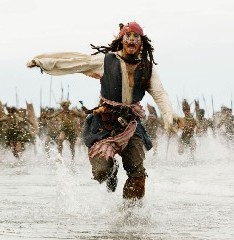 Given that it just enjoyed the biggest opening weekend ever and that #3 (World’s End) is already pretty much in the can, I suppose it doesn’t really matter what I thought of the relentlessly overstuffed Pirates of the Caribbean 2: Dead Man’s Chest, which I caught last Friday with the rest of America. Still, for what it’s worth, I found Pirates 2 both remarkably disappointing — sadly, this film is yet another whiff in a summer full of them so far– and literally stunning, in that the movie spends two and a half hours remorselessly beating the audience senseless with spectacle, to the detriment of plot, character development, pauses for breath, or anything else you might think to expect in a 150-minute flick. (AICN’s best reviewer, Alexandra du Pont, hit the nail on the head on this one: “The movie is stimulating without being dramatic. Nothing is properly contextualized..”) What we have here with Dead Man’s Chest is a reasonably well-directed film brimming over with talented actors (Say what you will about Orlando Bloom and Keira Knightley, but Johnny Depp, Bill Nighy, Jonathan Pryce, and Stellan Skarsgard? That’s a Murderer’s Row), expertly crafted special effects, striking cinematography, and — yes — rousing action sequences, and for some reason it all adds up to so much less than the sum of its parts. Pirates’ magic, this is.
Given that it just enjoyed the biggest opening weekend ever and that #3 (World’s End) is already pretty much in the can, I suppose it doesn’t really matter what I thought of the relentlessly overstuffed Pirates of the Caribbean 2: Dead Man’s Chest, which I caught last Friday with the rest of America. Still, for what it’s worth, I found Pirates 2 both remarkably disappointing — sadly, this film is yet another whiff in a summer full of them so far– and literally stunning, in that the movie spends two and a half hours remorselessly beating the audience senseless with spectacle, to the detriment of plot, character development, pauses for breath, or anything else you might think to expect in a 150-minute flick. (AICN’s best reviewer, Alexandra du Pont, hit the nail on the head on this one: “The movie is stimulating without being dramatic. Nothing is properly contextualized..”) What we have here with Dead Man’s Chest is a reasonably well-directed film brimming over with talented actors (Say what you will about Orlando Bloom and Keira Knightley, but Johnny Depp, Bill Nighy, Jonathan Pryce, and Stellan Skarsgard? That’s a Murderer’s Row), expertly crafted special effects, striking cinematography, and — yes — rousing action sequences, and for some reason it all adds up to so much less than the sum of its parts. Pirates’ magic, this is.
So, what’s the gist of Dead Man’s Chest, besides all the furious running back and forth, and then back again? Well, that’s most of it. Somewhere in there, a malevolent magnate of the East India Company (Tom Hollander, doing a Peter Sarsgaard impression) has decided to break up the wedding of Will Turner (Bloom, bland and pretty) and Elizabeth Swann (Knightley, pretty and bland), in order to send them out to locate the formidable Captain Jack Sparrow (Depp, even stranger than last time) and — more importantly — his magic compass. Sparrow, meanwhile, has run afoul of the unfortunately not-so-mythical Davy Jones (Nighy, by way of Serkis), the squid-headed commandant of a ship of lost souls — among them Bootstrap Bill Turner (Skarsgard), Will’s dad — that he has retrieved from shipwrecks (and who are now turning into sea creatures as a side-effect of their Faustian bargain.)
With the board thus set, the pieces move…and boy, do they. Jack and Will spend a good forty-five minutes running to and from natives, Elizabeth stows away on a “haunted” ship, Will serves some time with dear old Dad, the Kraken — a ginormous creature of the deep — attacks not once, not twice, but three times (“ah ah ah!), everyone stops in for a few voodoo sessions and/or swordfighting, and all the characters from the first movie drop by every once in a while for a pop-in or three. This all may sound fun, but trust me — the frenetic result goes from intriguing to exhausting to mind-numbing in surprisingly short order. After a smile on my face for the first quarter-hour, I was starting to check out after forty-five minutes, trying to will my watch faster after seventy-five, and was ready to cut a deal with Davy Jones myself by minute one-hundred.
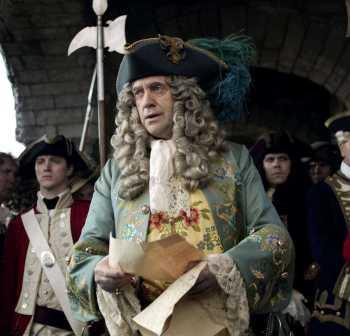 I liked the first Pirates, although I also said that it felt twenty minutes too long, Well, for almost its entire running time, Dead Man’s Chest basically feels like being trapped in that extra twenty minutes. Still, I have to admit, it also feels like something of a watershed. Perhaps the best way to look at Pirates 2 is as [a] an homage to the action-packed, plot-irrelevant, somewhat nonsensical pirate serials of yesteryear and [b] a sequel to a movie based on a Disney theme park ride — really, how good could it have been? And yet, in another way this really does feel like the type of flick film historians of the future might look back to as a signpost in the devolution of American film — as the moment when the summer blockbuster ethos, Krakenlike, effectively swallowed the moviemaking process whole. (There may be something about the increasing caffeinization and decreasing attention span of America in there somewhere too.) I mean, when reasonably talented people get together to spend a whopping $225 million and hundreds of man-hours to make a “movie” like this, which, as DuPont also suggested in her review, is effectively a two and a half hour version of Indy running from the big ball in Raiders — and then are so amply rewarded for it, to boot — one has to fear for the quality of future film offerings. Can we turn this ship around, or are we just going to have to watch it run aground?
I liked the first Pirates, although I also said that it felt twenty minutes too long, Well, for almost its entire running time, Dead Man’s Chest basically feels like being trapped in that extra twenty minutes. Still, I have to admit, it also feels like something of a watershed. Perhaps the best way to look at Pirates 2 is as [a] an homage to the action-packed, plot-irrelevant, somewhat nonsensical pirate serials of yesteryear and [b] a sequel to a movie based on a Disney theme park ride — really, how good could it have been? And yet, in another way this really does feel like the type of flick film historians of the future might look back to as a signpost in the devolution of American film — as the moment when the summer blockbuster ethos, Krakenlike, effectively swallowed the moviemaking process whole. (There may be something about the increasing caffeinization and decreasing attention span of America in there somewhere too.) I mean, when reasonably talented people get together to spend a whopping $225 million and hundreds of man-hours to make a “movie” like this, which, as DuPont also suggested in her review, is effectively a two and a half hour version of Indy running from the big ball in Raiders — and then are so amply rewarded for it, to boot — one has to fear for the quality of future film offerings. Can we turn this ship around, or are we just going to have to watch it run aground?
In today’s trailer bin, Brazil alums Jonathan Pryce and Ian Holm reunite (as voice talent, with Daniel Craig and Catherine McCormack) in the Sin City-ish new trailer for Christian Volckman’s Renaissance, and Adrien Brody delves into the death of Superman (a.k.a. George Reeves a.k.a. Ben Affleck), with Diane Lane and Bob Hoskins on hand, in the new trailer for Allen Coulter’s Hollywoodland. Update: And one more: Edward Norton conjures up trouble for the powers-that-be (with Paul Giamatti, Jessica Biel, and Rufus Sewell) in the new trailer for The Illusionist (not to be confused with Christopher Nolan’s The Prestige, due out later in the year.)